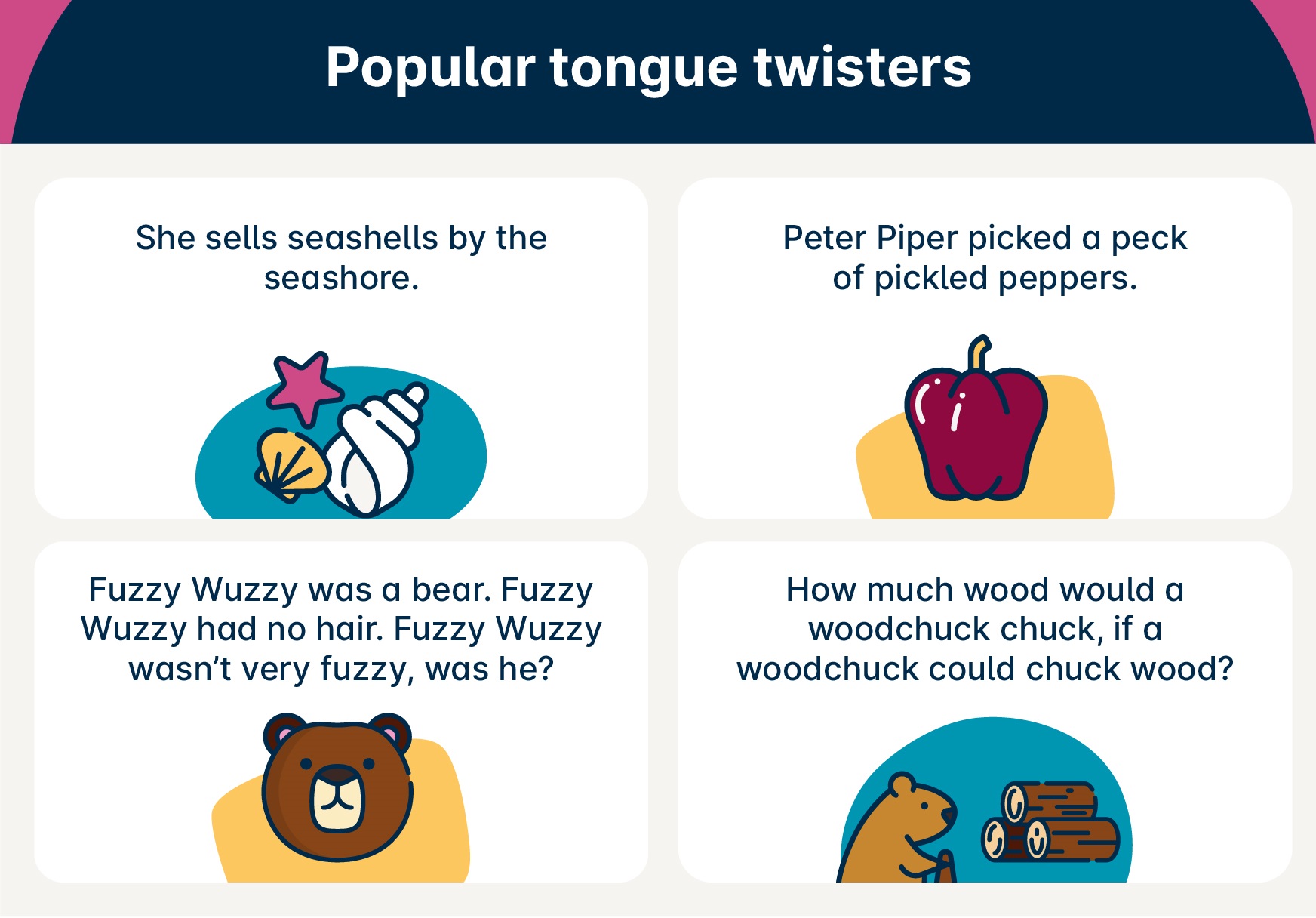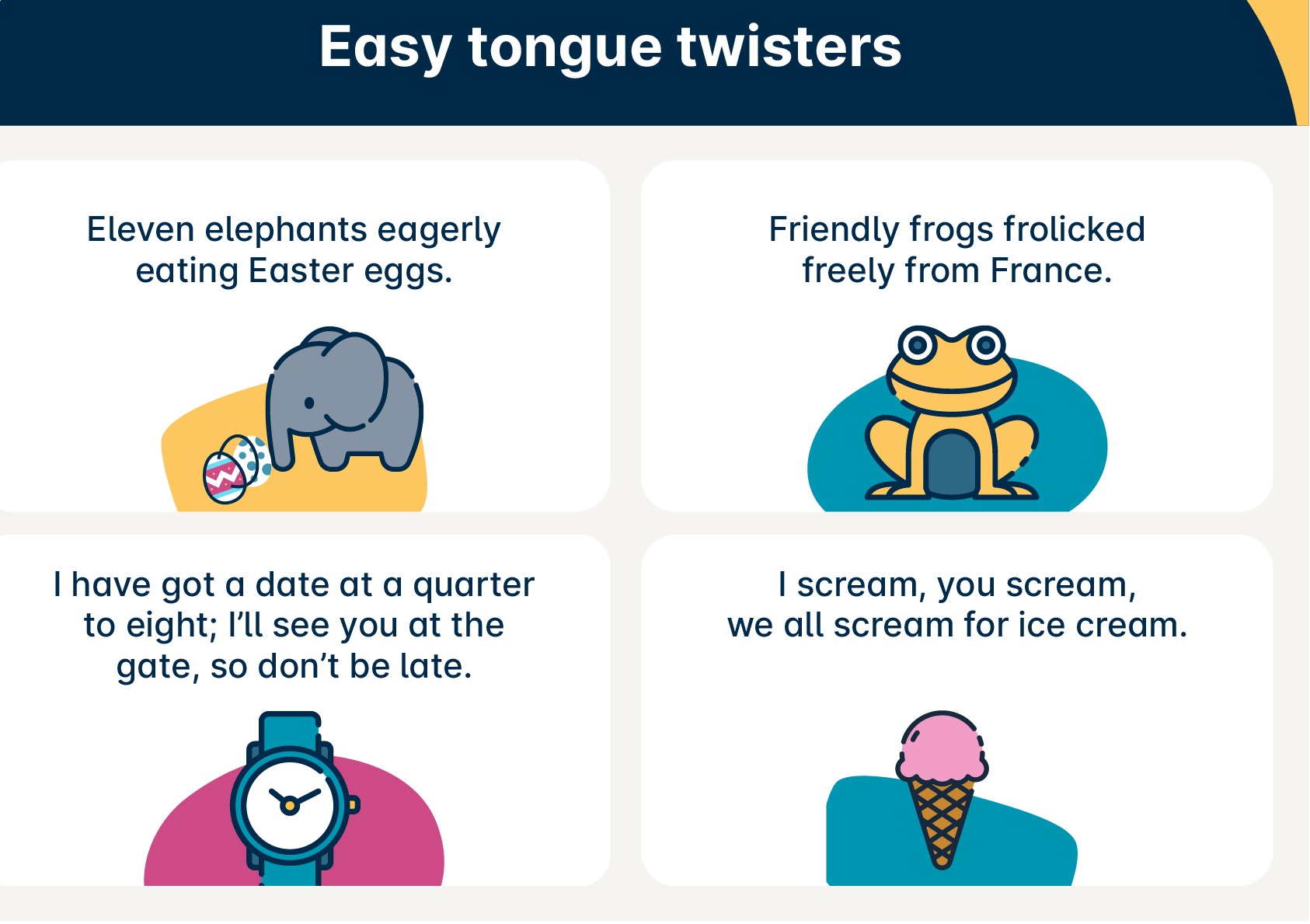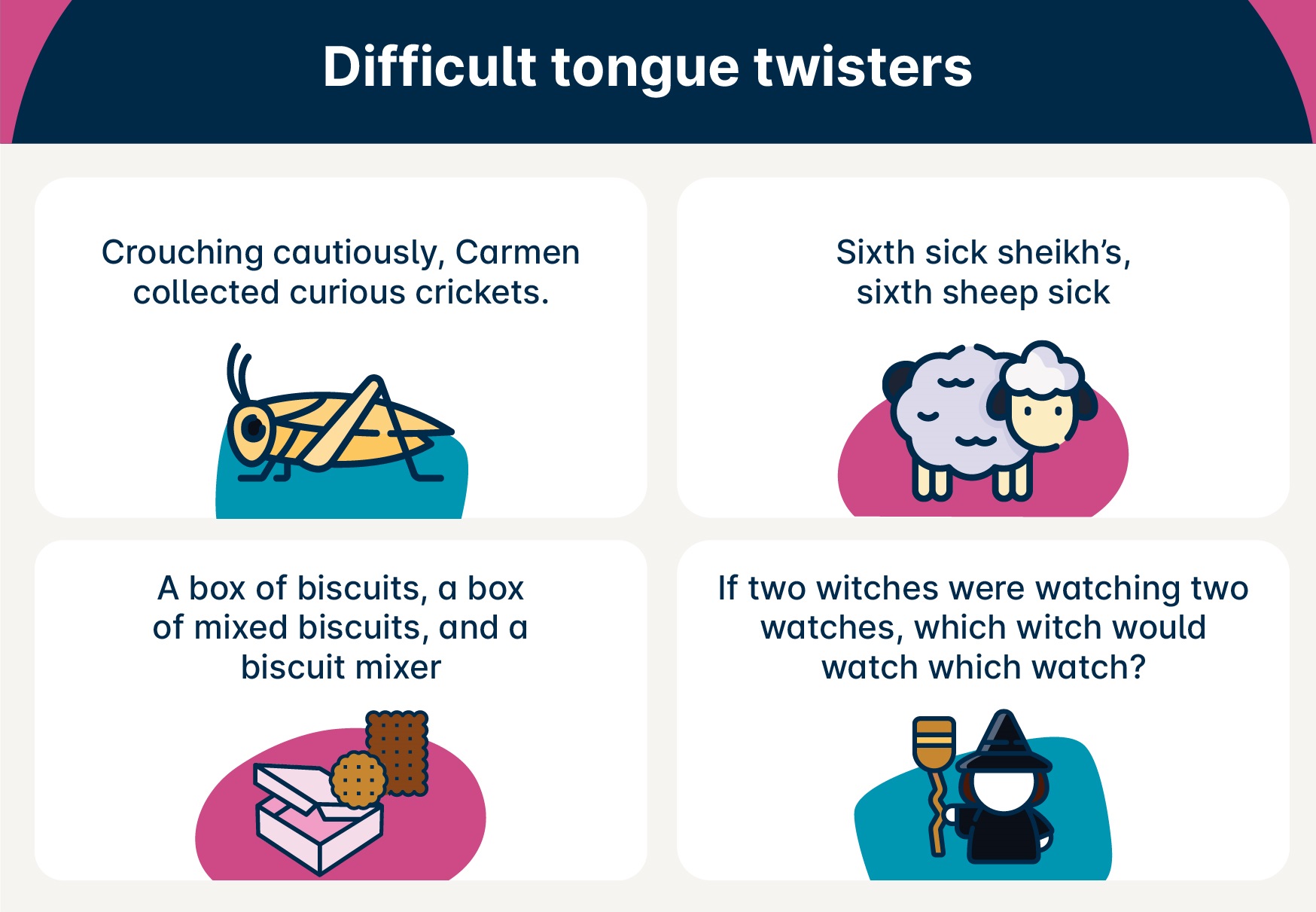Using English tongue twisters is an excellent method to strengthen your pronunciation skills and improve your English language.
What is your English level?
Find out your A1 A2 B1 B2 C1 C2 level of English with our quick, free online test.
English tongue twisters are entertaining phrases that can aid in the enhancement of your English pronunciation and grammar. Tongue twisters are challenging to articulate because they often repeat similar sounds or sequences of sounds. For instance, the famous phrase “She sells seashells by the seashore” emphasizes the repetition of the “sh” and “s” sounds.
If you’re looking to learn English, tongue twisters offer an enjoyable way to refine your language skills and demonstrate how two words can sound alike (like “through” and “threw”) or have identical spellings (like “can” and “can”) yet convey different meanings.
It’s worth noting that even many native speakers struggle with English tongue twisters, so don’t be discouraged if you find them tricky as well. Just take a deep breath, slow down, and give it another try. Let’s begin.

Top tongue twisters
If you were to inquire with native speakers about a tongue twister, it’s likely they would suggest one of these. These are unquestionably among the most well-known English tongue twisters!
1. She sells seashells by the seashore.
2. How much wood would a woodchuck chuck, if a woodchuck could chuck wood?
3. Peter Piper picked a peck of pickled peppers.
4. Fuzzy Wuzzy was a bear. Fuzzy Wuzzy had no hair. Fuzzy Wuzzy wasn’t very fuzzy, was he?

Easy tongue twisters
Brief tongue twisters can be equally challenging to pronounce compared to longer ones. The complexity of tongue twisters is determined by the proximity and repetition of similar sounds. Tongue twisters with similar sounds that are more spaced out are simpler to articulate than those with closely positioned sounds.
For instance, pronouncing “red lorry, yellow lorry” is just as demanding as saying “six slippery snails slid slowly seaward.” Explore the collection of short and beginner-friendly tongue twisters provided below.
6. A noisy noise annoys an oyster.
7. Eleven elephants eagerly eat Easter eggs.
8. Friendly frogs frolicked freely from France.
9. He happily held his hat in his hand.
10. I have got a date at a quarter to eight; I’ll see you at the gate, so don’t be late.
11. I saw Susie sitting in a shoe shine shop.
12. I scream, you scream, we all scream for ice cream.
13. I wish to wish the wish you wish to wish.
14. Three free throws.
15. Toy boat, toy boat
16. Xander the xylophonist played his xylophone for the fox.
Are you C1 Advanced English?
Get your C1 Advanced English certificate now!
✓ Add your certificate to your resume
⭐ ⭐ ⭐ ⭐ ⭐

Intermediate tongue twisters
The tongue twisters presented in this section will pose a greater challenge, as they feature sounds that are even closer together than the simpler ones, and these sounds are repeated more frequently.
17. Adam ate an apple, and Amanda ate an apricot.
18. Can you can a can as a canner can can a can?
19. Dashing Danny danced at dawn.
20. Grace gracefully greeted the grateful guests.
21. How can a clam cram in a clean cream can?
22. If a dog chews shoes, whose shoes does he choose?
23. I have a saw that can saw as much as a saw can saw when a saw can saw as much as a saw can saw.
24. I slit the sheet, the sheet I slit, and on the slitted sheet, I sit.
25. Ivy eyed Ivor’s ivory idol in the ivy.
26. Lila’s lovely lilacs lull the little lizards to sleep.
27. Mighty Max made a map of the maze in the meadow.
28. Nora never knits near noisy neighbors.
29. Red lolly, yellow lolly, red lolly, yellow lolly.
30. Red lorry, yellow lorry
31. Round and round the rugged rocks, the ragged rascal ran.
32. She sells seashells by the seashore, and the shells she sells are seashells, I’m sure.
33. Six slippery snails slid slowly seaward.
34. Walter’s wagon wheel went westward with a wobbly whirl.
35. Yancy yanked the yellow yarn from Yolanda’s yard.
36. Ziggy the zebra zigzagged through the zoo with a zany zither.

Difficult tongue twisters
The level of difficulty of certain tongue twisters may be influenced by your native language. If certain sounds aren’t present in your native language, you may find them harder to pronounce.
Nonetheless, for everyone, tongue twisters become more challenging when similar sounds are closely grouped. For example, the tongue twister “sixth sick sheik’s, sixth sheep sick” earned the title of the most difficult tongue twister in the 1974 World Guinness Records. Despite its extreme difficulty, repeating it multiple times can assist you in learning the “th” and “s” sounds.
There’s no need to be intimidated by demanding tongue twisters. Use them as a warm-up for your English lesson or as a tool to enhance your confidence as an English speaker.
37. A big black bug bit a big black bear.
38. A box of biscuits, a box of mixed biscuits, and a biscuit mixer.
39. A proper copper coffee pot.
40. Black background, brown background.
41. Brisk brave brigadiers brandished broad bright blades, blunderbusses, and bludgeons, balancing them badly.
42. Crouching cautiously, Carmen collected curious crickets.
43. How much caramel can a canny cannonball cram in a camel if a canny cannonball can cram caramel in a camel?
44. If two witches were watching two watches, which witch would watch which watch?
45. Imagine an imaginary menagerie manager managing an imaginary menagerie.
46. Irish wristwatch, Swiss wristwatch.
47. I wish to wash my Irish wristwatch.
48. I wish to wish the wish you wish to wish, but if you wish the wish the witch wishes, I won’t wish the wish you wish to wish.
49. Jennifer juggles jugs of juicy juice.
50. Karl’s colorful kite caught a colossal king-sized koala.
51. Near an ear, a nearer ear, a nearly eerie ear.
52. Oranges often offer optimal opportunities for orange orchards.
53. Pad kid poured curd pulled cod.
54. Peter Piper picked a peck of pickled peppers. A peck of pickled peppers Peter Piper picked. If Peter Piper picked a peck of pickled peppers, where’s the peck of pickled peppers Peter Piper picked?
55. Quickly, quiet quails quiver in the quarry.
56. Rita ran round the rough and rugged rock.
57. She sees cheese, she sees cheese, she sees the cheese, she seized the cheese.
58. Sixth sick sheikh’s, sixth sheep sick
59. Six sleek swans swam swiftly southwards.
60. Silly Sally swiftly shooed seven silly sheep. The seven silly sheep Silly Sally shooed shilly-shallied south. These sheep shouldn’t sleep in a shack; sheep should sleep in a shed.
61. The thirty-three thieves thought that they thrilled the throne throughout Thursday.
62. The seething sea ceaseth and thus the seething sea sufficeth us.
63. Timmy tickled Tiny Tim’s toe and Tiny Tim giggled.
64. Unique New York, you need unique New York.
65. Violet vixens viciously vow to vex the vexation in Valencia.
Additional ways to improve your English pronunciation
In addition to tongue twisters, there are numerous methods to enhance your English pronunciation, including:
- Reading aloud. Hearing yourself pronounce English words and phrases can help you pick up on any issues you might be having with pronunciation as well as allow you to recognize when you do correctly pronounce words or phrases.
- Record yourself. This can show you what shapes your mouth makes when pronouncing a certain sound, allowing you to adjust as needed.
- Speak slowly. When you read in your head, you run past the words quickly, but when you read aloud slowly, you can pay attention to details you might zip past otherwise.
- Watch videos. Watching videos of English speaking can help you recognize certain mouth shapes for proper pronunciation as well as tongue placement for new words you’re trying to learn.
- Take lessons. A professional English tutor can help you learn all aspects of the language properly from the start.
Effective communication entails articulating words clearly and using the appropriate words at the appropriate times. English tongue twisters, though both challenging and enjoyable, serve to strengthen precise pronunciation and expand your vocabulary.
Whether you’re a novice or a more advanced English learner, practicing these tongue twisters with speed and repetition will assist you on your path to becoming fluent in English.
Nonetheless, the potential of tongue twisters has its limits. While they are a valuable tool for reinforcement and a way to test your pronunciation abilities, if you aspire to communicate with confidence, it’s advisable to seek assistance from a native English tutor who can offer tailored guidance and feedback on your pronunciation and overall language skills.
What is your English level?
Find out your A1 A2 B1 B2 C1 C2 level of English with our quick, free online test.





